 Hope Initiative Programs (HIP) in Africa
Hope Initiative Programs (HIP) in Africa
Livingstone Kegode
Hope Initiative Programs (HIP) in Africa is a humanitarian organisation based in Kenya at Bungoma county. It was founded in 2015 by Livingstone Kegode and the co-founder Fredrick Manzugu.
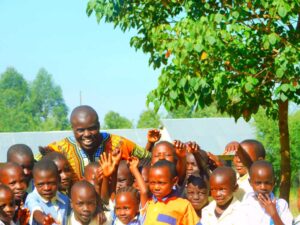
The major reason for starting HIP Africa was to educate the most vulnerable children from rural areas and have them connected nationally and internationally to their peers through video conferencing platforms like Skype and Zoom. We also wanted to coordinate with educators and well wishers from around the globe to pay them a visit and volunteer in every aspect that would motivate these children.
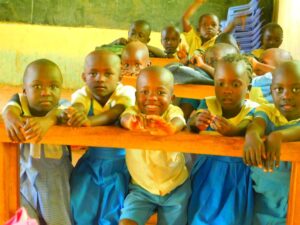
Apart from a learning center, we have other programs like Water, Sanitation and Hygiene (WASH). WASH aims to provide the school and more than 1000 households in the community with clean and drinkable water. Our kitchen garden provides learning opportunities and fresh vegetables for our school and the community. Our Information Communication Technology program (ICT) provides basic technological skills for our students and the young generation in the community. Above all, we have Community Based Education (CBE) too to act as a bridge between learners and the community.
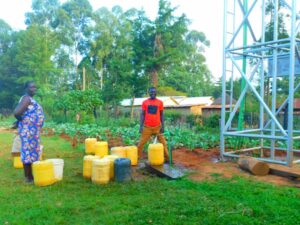
HIP Africa has had a positive impact not only on its learners but also on the community at large. It has provided a place for students to access quality education for free, and has provided access to clean and drinkable water for learners and the community. It is also providing meals twice a day in an effort to make sure that students can settle in class and concentrate on the learning that goes on. Most of the learners barely get a meal at home, thus, it is hard for them to concentrate in class. If we provide something for them. It makes them happy, healthy and able to concentrate in class. Most of the learners walk an average distance of three miles to reach the center, and some also have to cross the river in the foggy early mornings. This makes them exhausted and worn out before we even start our day, so we provide a cup of tea or porridge and a snack. The center has supplied water filters to more than 100 households in the community with an aim of reducing waterborne diseases in order to control absenteeism in school and to improve the health of the general community.
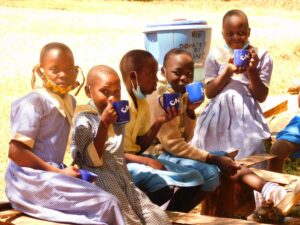
The center is trying to inspire, educate and create opportunities for the less fortunate to improve their well-being and achieve their dreams through our humanitarian, tailored support programs. The center also lays the foundation on which the community can transform its young people intellectually to curb ignorance, immorality, and drug abuse — and offer equal access to quality education through our educational programs.
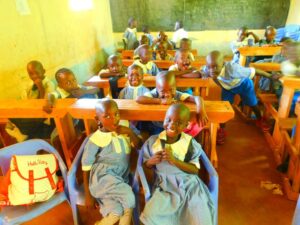
HIP Africa has put more effort into enhancing learning through the use of technology and allows children to embrace self-discovery, teamwork, and problem-solving skills, thus promoting education for sustainable development and global citizenship through technology and other platforms.
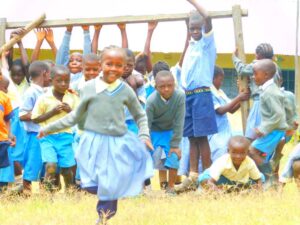
HIP Africa is supported by donations, and is facing some new challenges in making our dreams come true. With the increase in population and COVID-19 regulation, one of our most urgent issues is the need to build additional classrooms to create more space for the students for proper distancing. Luckily, we have the blue print ready and approved, but are still looking for funds to put up two classrooms this year. Our ongoing challenges include a lack of enough food supply at the center, so sometimes students spend a day or two with nothing to eat, a lack of classroom materials for educators and learners, which makes teaching difficult, and a lack of funds to pay for our electricity bills. We use electricity for lighting, powering of our electronics and pumping of water from the drilled well to its storage. Sometimes we go for a week or two with no electricity, and this makes our operations difficult.
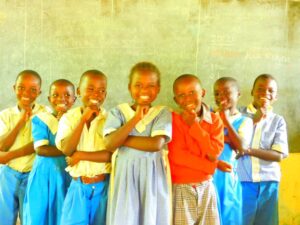
HIP Africa is dearly looking for well-wishers to sponsor its programs as it entirely relies on small donations from individuals. If you might be interested in joining our support team, please visit our website for more information and how to donate: www.thehipafrica.org, like our Facebook page: https://web.facebook.com/HIPinAfrica and follow us on Twitter: https://twitter.com/hip_africa LinkedIn: https://www.linkedin.com/in/hip-africa-ba50b5205/

 Smooth seas have never made skilled sailors
Smooth seas have never made skilled sailors COVID education: a window of hope or the writing on the wall?
COVID education: a window of hope or the writing on the wall? Challenges and opportunities in Argentina
Challenges and opportunities in Argentina